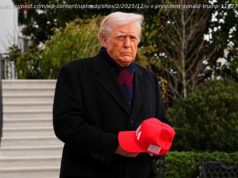Congress gave the director of the Consumer Financial Protection Bureau an unusual amount of autonomy — including the power to appoint a successor.
Last week, Richard Cordray, the director of the Consumer Financial Protection Bureau, whose term was to end in July, pulled the bureaucratic equivalent of a “dead hand” maneuver. Having announced that he was departing at the end of the month, he abruptly left on Friday, appointing his deputy, Leandra English, as his successor. President Trump and the Republicans are eager to pare back or even close the bureau, and the president wasted no time in appointing Mick Mulvaney, the director of the Office of Management and Budget, as interim director as well.
Both Ms. English and Mr. Mulvaney showed up for work on Monday, but not before she filed a suit against Mr. Trump and Mr. Mulvaney, claiming that Mr. Cordray, not the president, had the power to appoint an interim director. While the president normally has control over appointments in the executive branch, in this case, Ms. English is right.
This isn’t normally the case. But in creating the bureau as part of the Dodd-Frank reforms in 2010, Congress intentionally gave it an unusual degree of autonomy. If the bureau’s powers are constitutional, as I believe they are, they can be overturned only by Congress — which means that Ms. English can run the agency until the Senate confirms a successor to start in July when the term ends, or the president removes her “for cause,” which means more than mere political or policy disagreement.
The bureau’s constitutional status has always been controversial; the Court of Appeals for the District of Columbia Circuit is poised to issue an opinion in a challenge to the agency that is likely to go to the Supreme Court. The constitutional issues at stake go way back to the very first Congress, in 1789, when it gave the president the power to remove the secretary of state at will. This has been the rule for cabinet officials ever since. But Congress controls the creation, powers, structure and budgets of the executive agencies, including the standards for removing sub-cabinet officials. This element of the separation of powers at the heart of our constitutional system ensures constant conflicts between the president and Congress.
In creating the bureau, Congress gave the director a fixed term, which the White House can terminate only for cause; allowed him or her to designate a successor until the Senate confirms someone else; and, perhaps most important, funded the agency not in the usual way through Congress but through the Federal Reserve (itself independent in many ways).
This autonomy has prompted a legal challenge under a theory, endorsed by many constitutional scholars, that the agency violates the “unitary executive” principle. Under this theory, Congress cannot hobble the president by encroaching too much on his powers in its effort to influence the bureaucracy where so much power resides. If Congress insulates an agency too much from presidential control of its leadership, budgets, procedures and other agency functions, it violates the separation of powers.
But the core constitutional issue is, how much independence is “too much”? Since the late 19th century, after all, Congress has created many independent federal agencies with broad regulatory powers and various limits on presidential control, especially the power to fire its personnel. The crucial point is that the Supreme Court has allowed different limits for different types of agencies.
In its Humphrey’s Executor decision, the Supreme Court in 1935 prevented Franklin Roosevelt from firing a member of the Federal Trade Commission for political and policy differences; the governing statute allowed him to fire commissioners only for cause, defined as “inefficiency, neglect of duty or malfeasance in office.” In an earlier decision, it had allowed the president to fire a postmaster, a “purely executive” office, for any reason. But the F. T. C. statute was different, it said: Congress had limited the reasons for firing commissioners, believing that “length and certainty of tenure would vitally contribute” to the independence it wanted for the commission. In 1988, the court relied on the Humphrey’s Executor decision to uphold a law authorizing a powerful independent counsel whom the attorney general could fire “only for good cause.” The statutory schemes in each of these cases were different, and the court has interpreted the separation of powers principle flexibly. Therefore, it’s likely the court will uphold the provision limiting the president’s power to fire the C. F. P. B.’s director.
The extent of an agency’s independence, and the forms that independence should take, are debatable decisions, with complex pros and cons. This is why the court has allowed Congress considerable latitude in designing the agency’s powers. To most Republicans, giving the consumer bureau’s director such independence of the president encourages unaccountable bureaucratic tyranny. In 2010, Congress considered and rejected this argument in a largely party-line vote. Since regaining control of Congress in 2015, the Republicans have tried but failed to repeal the portion of Dodd-Frank that created the bureau; while the House passed such a bill, the Senate has not.
Limiting the power of the bureau’s director to appoint his own interim successor will be a core goal of any Republican effort to reform the agency. But Congress has to take that step, through legislation — not the president, through fiat.






